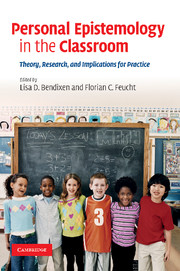Book contents
- Frontmatter
- Contents
- List of figures
- List of tables
- Contributors
- Part I Introduction
- Part II Frameworks and conceptual issues
- 2 Manifestations of an epistemological belief system in preschool to grade twelve classrooms
- 3 Epistemic climate in elementary classrooms
- 4 The integrative model of personal epistemology development: theoretical underpinnings and implications for education
- 5 An epistemic framework for scientific reasoning in informal contexts
- 6 Who knows what and who can we believe? Epistemological beliefs are beliefs about knowledge (mostly) to be attained from others
- Part III Students' personal epistemology, its development, and its relation to learning
- Part IV Teachers' personal epistemology and its impact on classroom teaching
- Part V Conclusion
- Index
2 - Manifestations of an epistemological belief system in preschool to grade twelve classrooms
Published online by Cambridge University Press: 04 May 2010
- Frontmatter
- Contents
- List of figures
- List of tables
- Contributors
- Part I Introduction
- Part II Frameworks and conceptual issues
- 2 Manifestations of an epistemological belief system in preschool to grade twelve classrooms
- 3 Epistemic climate in elementary classrooms
- 4 The integrative model of personal epistemology development: theoretical underpinnings and implications for education
- 5 An epistemic framework for scientific reasoning in informal contexts
- 6 Who knows what and who can we believe? Epistemological beliefs are beliefs about knowledge (mostly) to be attained from others
- Part III Students' personal epistemology, its development, and its relation to learning
- Part IV Teachers' personal epistemology and its impact on classroom teaching
- Part V Conclusion
- Index
Summary
The purpose of this chapter is to present the potential implications of personal epistemology from a multidimensional perspective on preschool to grade twelve research and instruction. The chapter is divided into six major sections. The first section provides a summary of the epistemological belief system as it was originally proposed by Schommer in 1990. The second section presents the more recent embedded systemic model of epistemological beliefs (Schommer-Aikins, 2004). The third and fourth sections set the ground work for others in developing more complex models. We do this by highlighting recursion and possible scenarios of epistemological beliefs and cognitive development at specific points of recursion. Finally, we offer educational implications and research ideas that highlight epistemological beliefs and their place among other systems.
An epistemological belief system
The notion that personal epistemology should be conceptualized as an epistemological belief system was inspired by research that spans almost forty years. Perry (1968, 1970) conducted research with Harvard undergraduates that led him to conclude that undergraduates enter college thinking knowledge is simple, certain, and handed down by authority. By the time they reach their senior year, students' thinking changes to believe knowledge is complex, tentative, and derived from reason and evidence. For the next twenty-two years other researchers (e.g., Kitchener and King, 1989; Baxter Magolda, 1987; Ryan, 1984), influenced by Perry, developed research agendas that explored varying aspects of personal epistemology. Those researchers and their colleagues tended to focus on a specific aspect of personal epistemology.
- Type
- Chapter
- Information
- Personal Epistemology in the ClassroomTheory, Research, and Implications for Practice, pp. 31 - 54Publisher: Cambridge University PressPrint publication year: 2010
- 6
- Cited by



